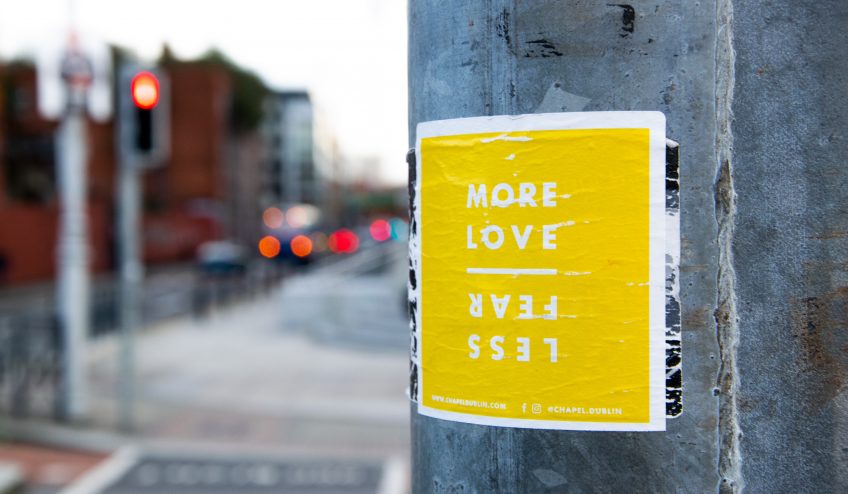What the world needs now is love, sweet love
It’s the only thing that there’s just too little of
What the world needs now is love, sweet love,
No not just for some but for everyone.
“What the World Needs Now” by Dionne Warwick
Every time I look up, every time I look down
No one’s on a common ground
(Where’s the love)
And if you never speak truth then you never know how love sounds
(Where’s the love)
And if you never know love then you never know God, wow
(Where’s the love)
Where’s the love y’all? I don’t, I don’t know
Where’s the truth y’all? I don’t know
“Where is the love?” by Black Eyed Peas
Do you remember the homework I set in my last blog?
Did you find the time or energy to read 1 John? If not you can now, it’s a short book.
The letters of John were written during a time of division within the early church. The church was growing and getting more established across Asia Minor at that time, and with so many different cultures and backgrounds coming together, you could expect that there were likely to be disagreements. That’s a major reason for why John was writing to these churches and it is driving the message he’s trying to get across, which is to love one another as God has loved everyone. This love is the foundation on which to build everything else.
It is disappointing to see that in the history of the church there have often been splits. Rather than celebrate different cultures and backgrounds, people just group together with similar like-minded people. I want Ignite to be a place where we have different cultures, backgrounds, thoughts, lifestyles all rolled in together. A place where love truly is the foundation on which we build everything else.
In 1 John 4, we read this: ‘There is no fear in love. But perfect love drives out fear, because fear has to do with punishment. The one who fears is not made perfect in love.’ This verse has often been used out of context in a manner that increases anxiety, shame and guilt.
Let’s push the lens back – this line comes in a section which begins ‘Dear friends, let us love one another, for love comes from God.’ This little section is focused on how we, normal humans, love each other. I think that changes how we read ‘the one who fears is not made perfect in love’.
I think, perhaps, this is not so much a critique of individual behaviour, i.e. you fear therefore you do not love or know God, as much as it is a critique of community behaviour, i.e. you (the community) have held back love in favour of punishment and have therefore not given the person in question the chance to experience perfect love.
This is how Christianity has been experienced by many. With all the division, disagreement, and disunity in our own time, many have been exposed to a Christianity that is anything but loving. The Church has a mixed history with love and, in fact, has often been the source of more hate than love.
It’s no wonder people are hesitant to come back or check it out, and it’s no wonder people are “cool with the Jesus guy” but want nothing to do with Church. It’s no wonder people do not trust the church despite kneeling to Jesus.
Not to mention that these actions paint a picture of a God who is anything but love; a God who is only out to get us and punish us for what we’ve done wrong. Pictures like this are exactly what John is trying to combat.
He says in 1 John 4:20, “Those who say, ‘I love God,’ and hate their brothers or sisters, are liars; for those who do not love a brother or sister whom they have seen, cannot love God whom they have not seen.”
This is a message that is freeing and yet also, remarkably difficult. How as a community, do we gather together, respect our different voices, perspectives and values and continue to love one another?
We sometimes feel that it is important to have a ‘position’ on a given issue as a church community. This is understandable, but John appears to be saying that this may not be the best approach. Rather we focus on loving people instead of having a position on their actions. People are more important than positions.
At Ignite, we have been reaching after, and practicing, John’s way of doing things. Hopefully you may have noticed. We see the role of the church as helping people become followers of Jesus for themselves, rather than telling them what to believe. We value people above and beyond positions or dogma.
We encourage people to discuss what they hear, and to wrestle with it, rather than simply accepting what is taught. We tell them that they are not expected to agree with everything that is taught, but to consider and decide for themselves, asking questions, listening to God and discussing things with each other. Sharing together from our own cultures, backgrounds and experiences. Learning from each other and listening to God rather than ‘the leader’.
This, we hope, creates a community that is fluid in a sense. A community that changes and grows and moves as we seek out Jesus way of living on earth, to live life and life to the full. Christianity does not merely have interesting things to say about love. There is no Christian “version” of love or Christian “brand” of love. No, all love finds its source in God, and this is a fundamental claim of the Christian faith. So, as we participate in that love, we know God, and we know life.
We love because he first loved us.

